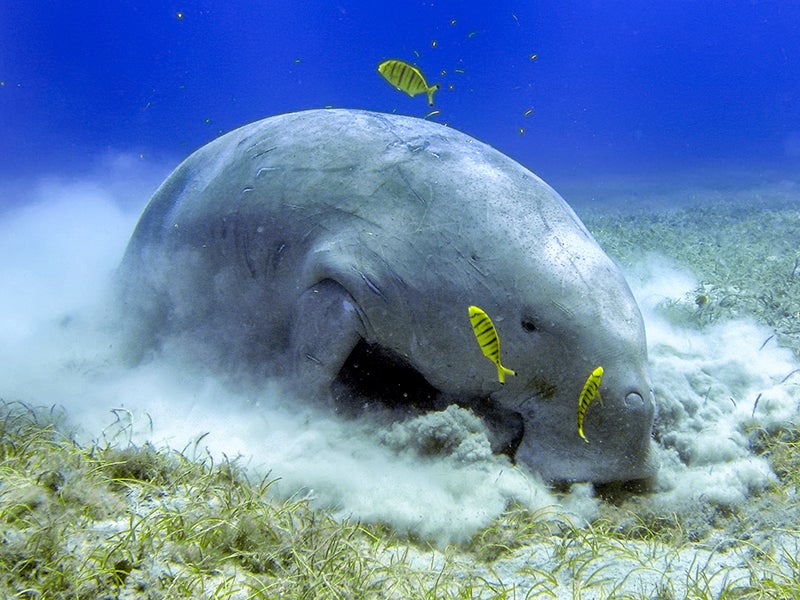Standing up for the Dugong, in Costumes and in Court
Earthjustice has asked the court to halt construction of a U.S. military base until the Department of Defense complies with laws dealing with preservation.

This page was published 7 years ago. Find the latest on Earthjustice’s work.
Update, 1/30/20: On Monday, February 3, Earthjustice will argue at the 9th Circuit Court of Appeals to challenge a 2018 district court judgment allowing plans for the construction of a U.S. military facility in Okinawa, Japan to move forward. The construction of this facility will pave and fill in the seagrass habitat of the critically endangered Okinawa dugong, a marine mammal also known as the “sea cow.” Our partners Turtle Island Restoration Network and Center for Biological Diversity will be gathering in front of the courthouse in San Francisco before the hearing to rally on behalf of the last remaining Okinawa dugongs. More information on the rally can be found here. You can also help support our partners in Japan who are gathering signatures to raise awareness about this issue by signing and sharing this petition.
Earthjustice and other environmental groups rallied on June 28 at a federal court in San Francisco against a U.S. military base planned for Okinawa, Japan. The base threatens the existence of the critically endangered Henoko Bay dugong, a marine mammal also known as the “sea cow.”
U.S. laws apply to American military bases overseas. Earthjustice has asked the court to halt construction of the base until the Department of Defense complies with laws dealing with preservation.
The dugong is a cultural icon to Okinawan people, and Japanese law protects the animal as an object of national cultural significance. As few as 20-50 dugongs remain in Henoko Bay.
“Our folktales tell us that gods from Niraikanai [afar] come to our islands riding on the backs of dugongs and the dugongs ensure the abundance of food from the sea,” said Takuma Higashionna, an Okinawan scuba-diving guide who is a plaintiff in the lawsuit.
The Department of Defense wants to expand a military base in Henoko Bay to replace an existing base in Ginowan, Okinawa. The base may lead to sea grass loss or degradation, water pollution, noise pollution and other effects forcing dugongs away from their natural habitat.
Earthjustice has been in court fighting to protect the dugongs and Henoko Bay since 2003, when we filed this lawsuit against the Department of Defense on behalf of Japanese and American environmental groups and Okinawan citizens.
Our lawsuit prompted the Department of Defense to study how the proposed base would affect the Okinawa dugong. The study concluded in 2014 that the base would not harm the dugong, but it failed to consult the Okinawan community as required by law.
On June 28, Earthjustice lawyer Sarah Burt argued that the Department of Defense’s failure to consult members of the Okinawan community was arbitrary and capricious. The National Historic Preservation Act requires federal agencies to consider the effects of their projects on historical properties both in and outside of the United States. Lawyers for the U.S. military conceded that the department did not consult local, non-academic community members, but argued that the department was “owed deference for the work and research done.”
“The purpose of the National Historical Preservation Act is to make sure that we don’t blunder into another country and inadvertently, or perhaps negligently, destroy their cultural icons,” says Burt. “The whole idea of this statute is, federal agencies need to look and find out what’s there, understand what the impact of their actions are going to be, and do what they can to avoid those actions.”
Prior to entering the hearing, almost 60 supporters from the Turtle Island Restoration Network, Center for Biological Diversity, Save the Dugong Foundation, and Japan Environmental Lawyers Foundation held a rally in front of the courthouse.
Members of the Okinawan community both in California and all the way from Japan also joined. They performed the Eisa drum dance and played the sanshin, a three-stringed lute similar to a banjo. The crowd chanted, “Stop the base construction! Protect the dugong now!”
Some crowd members wore vibrant cerulean shirts with the dugong in its natural coral habitat. Two crowd members wore costumes of the marine mammal. Others carried signs that read, “Military expansion kills dugongs,” and, “Do right by the dugongs.”
At the end of the rally, Hideki Yoshikawa, a native Okinawan and the head of the Save the Dugong Foundation, thanked Burt and others for supporting the survival of Okinawan people and culture.
“We want to show the people of the world how we can fight and continue to fight with the help of people like you. So, thank you very much and we hope to carry victory signs after we leave the courtroom,” Yoshikawa said.
Earthjustice has supported communities around the Pacific since 2001. We sued the Department of Defense in 2001, 2007 and 2009 for violating the National Environmental Policy Act when planning a fire training ground in Makua, Hawaiʻi. Earthjustice also filed a similar lawsuit against the Department of Defense in July 2016 to protect the people of the Mariana Islands from a fire training ground on the island of Pagan.
The International Program partners with organizations and communities around the world to establish, strengthen, and enforce national and international legal protections for the environment and public health.